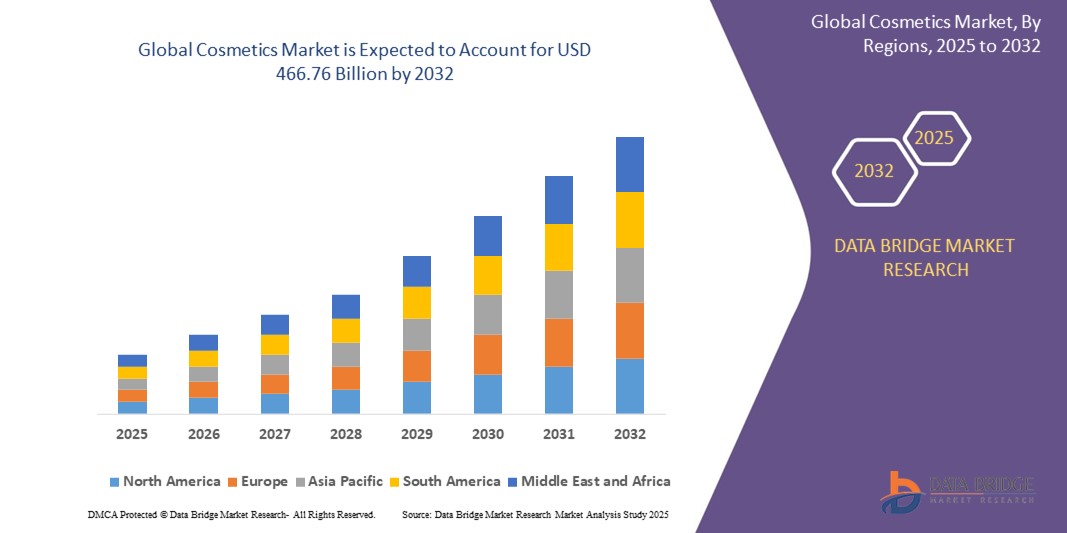Global Cosmetics Market: Transforming Beauty Through Innovation and Sustainability
Global Cosmetics Market Size, Share, and Trends Analysis Report – Industry Overview and Forecast to 2032
https://www.databridgemarketresearch.com/reports/global-cosmetics-market
- The global Cosmetics market size was valued at USD 284.57 billion in 2024 and is expected to reach USD 446.76 billion by 2032, at a CAGR of 5.80% during the forecast period

The global cosmetics market has evolved from a simple focus on personal appearance to a dynamic, innovation-driven industry that intertwines science, technology, and sustainability. With shifting consumer preferences, digital transformation, and the growing importance of ethical and natural formulations, the cosmetics sector is experiencing a period of remarkable growth and reinvention.
Market Overview
The cosmetics market encompasses a wide range of products including skincare, haircare, makeup, fragrances, and personal hygiene items. Over the past decade, this market has expanded significantly due to rising disposable incomes, growing beauty consciousness, and an increasing influence of social media and celebrity endorsements. The modern consumer seeks not just beauty enhancement but also wellness, safety, and transparency in cosmetic products.
Developed economies like the United States, France, Japan, and South Korea continue to dominate the cosmetics industry, while emerging markets such as India, China, and Brazil are rapidly catching up, fueled by urbanization, a growing middle class, and expanding e-commerce networks.
Key Market Drivers
1. Rising Beauty Awareness:
Consumers are increasingly investing in beauty and personal care as a part of self-expression and self-care. The rise of social media platforms such as Instagram, TikTok, and YouTube has amplified beauty trends, inspiring millions to explore new products and routines.
2. Technological Advancements:
Technology is transforming how cosmetics are developed, marketed, and personalized. From AI-based skin analysis tools to augmented reality try-on apps, tech integration is enhancing the shopping experience and building customer trust. Moreover, research in biotechnology and dermatology has led to the creation of innovative formulations that deliver better results with fewer side effects.
3. Shift Toward Natural and Organic Products:
There has been a noticeable shift in consumer preference toward clean beauty and organic cosmetics. People are now more aware of the potential effects of synthetic chemicals and prefer products made with natural, vegan, and cruelty-free ingredients. This movement has encouraged brands to adopt sustainable sourcing, recyclable packaging, and eco-friendly production processes.
4. E-commerce and Digitalization:
Online sales have revolutionized the cosmetics market. The availability of a wide range of products online, easy comparison of brands, customer reviews, and digital marketing strategies have made e-commerce platforms a dominant force in the industry. The COVID-19 pandemic further accelerated this transition, pushing even traditional brands to adopt digital-first models.
Market Segmentation
The cosmetics market can be segmented based on product type, distribution channel, gender, and region.
By Product Type: Skincare remains the largest segment, driven by anti-aging and sun protection products. Makeup follows closely, influenced by changing fashion trends and celebrity collaborations.
By Distribution Channel: The online channel has witnessed explosive growth, although offline retail stores and specialty boutiques continue to offer a tactile and personalized shopping experience.
By Gender: While women still dominate the cosmetics consumer base, men’s grooming and cosmetics are emerging as fast-growing categories, supported by the normalization of male beauty care across global markets.
Regional Insights
North America and Europe hold a substantial market share due to the presence of established brands, advanced R&D facilities, and strong consumer awareness. However, Asia-Pacific is the fastest-growing region, particularly in countries like China, South Korea, and India, where rising disposable incomes and social media influence are driving product demand. Latin America and the Middle East are also witnessing strong growth, supported by evolving beauty standards and increasing retail expansion.
Emerging Trends in the Cosmetics Industry
1. Clean Beauty and Transparency:
Consumers are demanding more transparency regarding ingredients and manufacturing processes. Brands are now displaying ingredient lists clearly and emphasizing ethical sourcing, creating trust and loyalty.
2. Personalization and AI Integration:
The future of cosmetics lies in customization. AI tools and data analytics are being used to offer personalized skincare regimens and shade recommendations, making the consumer experience more tailored and satisfying.
3. Sustainable Packaging:
Sustainability has become a priority. Refillable containers, biodegradable packaging, and minimal waste initiatives are being implemented to reduce the environmental footprint.
4. Inclusive Beauty:
The industry is embracing diversity and inclusion. Brands are now offering a broader range of shades, textures, and formulations to cater to all skin tones and types, reflecting a global shift toward representation and equality.
5. Hybrid Products:
Consumers are seeking multifunctional products that combine skincare and makeup, such as tinted moisturizers with SPF or foundations with anti-aging properties. This trend reflects the demand for convenience without compromising quality.
Challenges Facing the Cosmetics Market
Despite strong growth, the cosmetics market faces several challenges. Regulatory complexities across regions often create barriers for product launches. Counterfeit cosmetics and ingredient safety concerns also pose significant risks. Furthermore, rising competition and the constant demand for innovation force brands to invest heavily in R&D and marketing.
Additionally, sustainability efforts, while necessary, often increase production costs. Brands must balance eco-friendly initiatives with affordability to maintain competitiveness in price-sensitive markets.
Future Outlook
The future of the cosmetics market is promising, characterized by digital innovation, sustainability, and inclusivity. The integration of artificial intelligence, blockchain for ingredient transparency, and biotechnological breakthroughs will redefine how products are created and consumed. Brands that can merge ethical values with performance-driven results are likely to dominate the coming decade.
Moreover, the concept of “beauty from within” is gaining momentum, as consumers increasingly link beauty to health and wellness. This will encourage collaborations between cosmetic, nutraceutical, and dermatological industries, giving rise to a holistic beauty ecosystem.
Conclusion
The global cosmetics market stands at a pivotal point of transformation, shaped by evolving consumer values, technological progress, and sustainability imperatives. From clean beauty to inclusive representation, the industry is redefining the meaning of beauty itself. As innovation continues to blend with ethics and personalization, the cosmetics market will not only grow in value but also in purpose—empowering individuals to express themselves authentically while supporting a more sustainable and transparent beauty future.
Browse More Reports :
Global Cosmetics Market
Global Biochar Market
Global Black Soldier Fly Market
Middle East and Africa Cosmetics Market
Global Climbing Gym Market
Global Intelligent Transportation System (ITS) Market
Global Medical Devices Market
Global Parkinson’s Disease Treatment Market
Global Perovskite Solar Cell Market
Global Nanomedicine Market
West Africa Dairy Market
Europe Health and Wellness Food Market
Global Luxury Watch Market
Global Microalgae Market
- Art
- Causes
- Crafts
- Dance
- Drinks
- Film
- Fitness
- Food
- Juegos
- Gardening
- Health
- Home
- Literature
- Music
- Networking
- Other
- Party
- Religion
- Shopping
- Sports
- Theater
- Wellness



